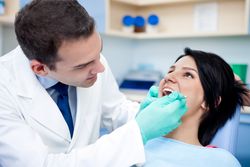
Although many people think of their lungs when they think of the harm smoking can do, the fact of the matter is that this habit impacts more than just your breathing. The dentists at Tohill Dentistry in Somerset, KY, explain that cigarettes and cigars can also damage the oral mucosa and the teeth, leading to problems ranging from simple bad breath to tooth loss. Here are three ways smoking can impact your oral health.
Smoking & Your Dental Health
1. Coats Your Teeth
During the manufacturing process, the paper in cigarettes is exposed to thousands of chemicals, including tar, formaldehyde, and even arsenic. As you smoke, these substances coat the surfaces of your teeth, staining dental enamel. These accumulations can become very thick, requiring special treatments to polish them away. Dentists can also help to lighten stains by prescribing special toothpaste or whitening the teeth.
2. Reduces Blood Flow
 The temperature changes inside your mouth that occur during smoking can thicken the lining of the oral mucosa, inhibiting blood flow. Over time, this thickened skin can even cause a condition called smoker’s keratosis, causing canker sores and pre-cancerous lesions called leukoplakia. Patients who smoke or who have smoked in the past should visit their dentist regularly for oral cancer exams.
The temperature changes inside your mouth that occur during smoking can thicken the lining of the oral mucosa, inhibiting blood flow. Over time, this thickened skin can even cause a condition called smoker’s keratosis, causing canker sores and pre-cancerous lesions called leukoplakia. Patients who smoke or who have smoked in the past should visit their dentist regularly for oral cancer exams.
3. Inhibits Your Oral Immune Response
Reduced blood flow also means your body has a more difficult time keeping tissues healthy, increasing smokers’ risk of infections. One infection smokers are especially susceptible to is periodontal disease, which is essentially inflammation and infection of the gum tissue. In fact, studies have shown that smokers are up to six times more likely to develop periodontal disease, a condition that can cause deep pockets in the gum tissue, swollen gums, tooth loss, and widespread infections.
Whether you recently stopped smoking or you need help restoring your smile after a lifelong habit, the dentists at Tohill Dentistry in Somerset, KY, can help. In addition to helping patients with routine cleanings, diagnostic tests, and treatment planning, this experienced father-son team can also help with reconstructive dental work, including implants. To learn more about their practice, explore their website or call (606) 679-4450.
About the Business
Have a question? Ask the experts!
Send your question

